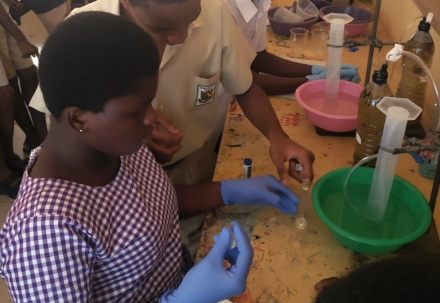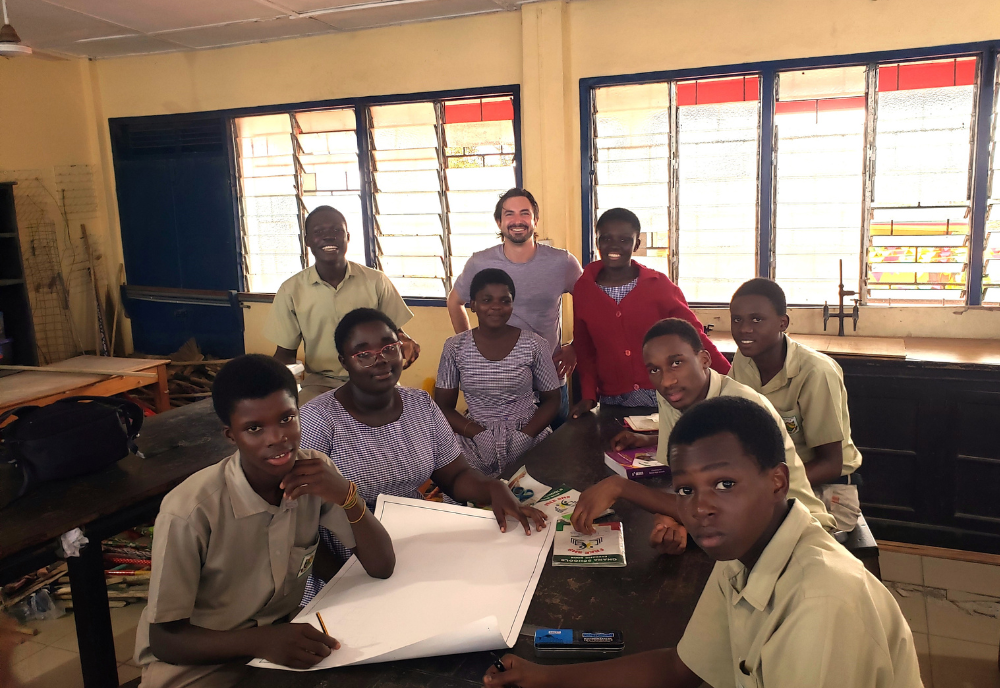
Students work on a mini-biodigester in Cape Coast, Ghana.
After seeing acid mine drainage make streams run red in his home state of West Virginia and pollution destroy life in rivers in developing countries, Nathan Lafata, 33, is in Cape Coast, Ghana, teaching sustainability strategies to high school students who give him hope for the future.
Lafata, a Patel College of Global Sustainability graduate student focusing on water sustainability, is teaching students at Ghana National College about biodigesters, a living system in which organic material decomposes through microbes to create methane and fertilizer, in a project funded by the National Science Foundation (NSF).
Here, in his own words, Lafata shares his background and motivation for working on this project:
BACKGROUND
I am from Morgantown, West Virginia; born and raised in the Mountain State. I was a teacher in Myanmar with the Peace Corps and Vietnam for a combination of two years abroad. If you count studying abroad, I have lived in Hungary and Poland for a year during my undergraduate.
EDUCATION
My undergraduate is from West Virginia University with a Bachelor of Arts in History and International Studies with a focus on development. Here at the University of South Florida, I am studying for a Master of Science in Water Sustainability at the Patel College of Global Sustainability (PCGS).
KEY RESEARCH INTEREST
Watershed restoration, coastal restoration, and water management. I enjoy topics that involve both the environmental and human aspects, a nexus between the two.
WHY ARE YOU INTERESTED IN THIS AREA?
I am interested in these topics because not only do people desperately require water, but all life requires it. Additionally, not just water, but good quality water. Throughout my life in West Virginia, I have seen streams run red from acid mine drainage, and in developing countries like Ghana, there are few rivers that can allow fish to live due to their pollution. Restoring these waters causes me to be passionate about the state of many places in our world.
WHAT RESEARCH/WORK ARE YOU CONDUCTING IN GHANA?
This research contributes to more water and waste management with our team teaching students at Ghana National College about biodigesters. Biodigesters teach students about the water, energy, food, and waste nexus. This nexus point will be something I will further study as I progress in my studies here at PCGS.
Rewarding outcomes
The most rewarding outcome has been my group of eight high school kids. They have given me hope for a better world and a better future. Sustainability is about them, their futures, and their kids as time goes on. Usually when we read or watch the news we lose hope. We lose our fire to pass pressing legislation or change our daily customer habits. These kids made me realize that the fight is worth it; they gave me hope.
Next Steps
My next goal is to apply for the Fulbright, Presidential Management Fellows, and Boren fellowships. These applications will be done before I graduate or directly after graduation. I want to keep working at the local or state level with regards to water management. However, as I progress in my career, I want to work with a federal agency like the USDA.
Motivation
Teaching in Ghana was inspirational. I was filled with hope. The children there invigorated me to keep pushing in my walk with sustainability. They were so curious about biodigesters and clean renewable energy. They understand the issues and challenges at hand. This experience gave me hope for a better tomorrow and a stronger, more resilient Africa.
